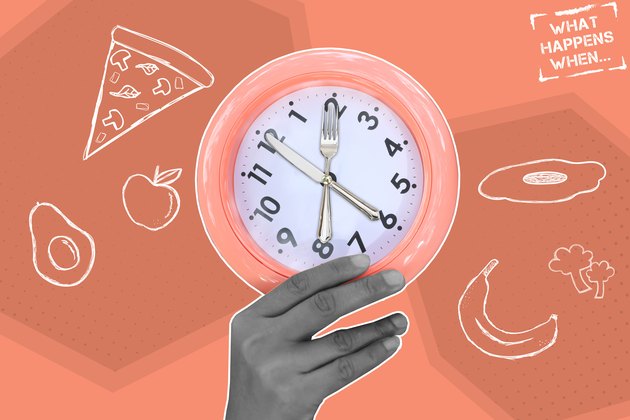
For those looking to lose weight, a meal plan that incorporates间歇性斋戒(aka time-restricted feeding) may sound like a smart choice. After all, prolonged calorie restriction has been linked to benefits for brain function, gut health, energy levels and metabolism. But how much do we really know when it comes to fasting's effects?
“禁食激活进化计划,其中我们的身体通常用于增长和繁殖的营养成分,朝着维修和生存的机制,”洛杉矶的营养师和练习公司的营养师和创始人惠特尼E. Rd.。
Translation: Abstaining from food for set periods of time may result in weight loss, but it also rewires your whole system. Here's what we know about fasting's effects on the body, from head to toe.
你的体重
“研究表明,禁食导致体重减轻,”英语说。但是,有一个抓住。“人们不会减少禁食的重量,而不是与传统的低卡路里饮食。”换句话说,只需减少您吃的食物量可能就像在某些小时内完全停止摄入一样有效。
2017年7月的研究发表于贾马内科,例如,发现交替日禁食并没有导致与正常的热量,肥胖个体之间的常规卡路里限制相比任何重量损失。
So why are meal plans that incorporate fasting often touted as no-brainer means to shed pounds? "They work simply by limiting the number of calories consumed," says艾米罗斯伯格,MD, director of the Metabolism, Endocrinology and Diabetes Investigational Weight Management Clinic at the University of Michigan. "Consider the average American who usually consumes meals and snacks over 12 hours every day. Limiting consumption to eight or even fewer hours generally will limit caloric intake."
但是禁食可能比简单的遏制摄入量更多。2012年6月出版的研究细胞新陈代谢发现小鼠在八小时的喂食窗口(通常被称为时间限制喂养或TRF)的方案中受到保护免受不良代谢结果,例如脂肪肝病和高胰岛素血症(高水平的血液中的胰岛素),与在当天的过程中消耗相同量的卡路里的小鼠相比。
Read more:初学者的5:2禁食减肥饮食的指南
你的胃口
"Counterintuitively, fasting has been shown to decrease the hunger hormone ghrelin," says English. So those who fast from, say, 8 p.m. until noon the next day may not feel the hunger pangs you'd expect at breakfast time.
唯一的问题?一旦你返回常规饮食模式 - 或在禁食和非禁食日之间来回切换 - 你可能会落后的机会。
这是因为人体在生物学上硬连线充满燃料,以避免饥荒。因此,据据此,神经递质和食欲激素在延长的剥夺期间可能会使您暴发过量。Harvard Health Publishing。
你的脑
这是一个令人惊讶的但是真实的事实:有些人报告感觉更加警觉和专注,同时遵守包含禁食的计划。“这种增强的脑功能可能会带来当我们的体系从使用葡萄糖来使用葡萄糖时ketone bodiesas an energy source," explains English. "Researchers call this 'intermittent metabolic switching' and believe that it adapted to help humans remain in a state of optimal functioning in order to hunt and gather food during periods of hunger."
This switch may help bolster neural networks' "resistance to stress, injury and disease" and potentially improve cognition and mood, per a February 2018 study published in自然评论神经科学。
你的胆量
动物研究suggest that intermittent fasting regimens can modify the makeup of the microbiome by increasing the proportion of health-promoting microbes in the gut, and they may even bolster animals'免疫反应致病性细菌感染,如沙门氏菌伤寒毒蕈。
然而,人类数据仍然缺乏。“将养分限制在肠道上可能会限制它需要做的工作,并且也可能改变[人]微生物组,这些微生物组有利于更健康的细菌,”Rothberg说。“但这是猜测。”
Read more:你需要了解益生元的一切 - 促进你的肠道健康的秘密成分
Your Insulin Sensitivity
In healthy individuals, eating triggers the release of insulin, the hormone that shuttles glucose (the product of carbohydrate digestion) into cells to be used for energy or stored for later. When we take a break from eating, insulin levels drop. The result? Improved insulin sensitivity, which is protective against diabetes.
“限制卡路里也转化为降低血糖,改善脂质和降低血压,”Rothberg说。“这已被展示在较低的低热量和非常低的热量饮食中的研究中,并且时间限制喂养具有一些相同的影响。”
虽然动物研究表明,时间受限制的饲养模式可以有助于逆转小鼠的代谢疾病的进展,从人类进行的临床试验中的结果报告混合结果。出版了随机临床试验贾马内科例如,在2017年7月,发现交替日禁食未提高心肌差异危险因素(思考:胰岛素抵抗,LDL胆固醇水平)任何超过每日卡路里的限制。
Read more from our '什么时候真的发生了什么' series.
快速或不快速(o)?
没有放之四海而皆准的回答,但剥夺the body of food for extended periods of time is unlikely to be sustainable — or enjoyable — for most people. If taken too far, fasting may lead to anunhealthy relationship with food。为此原因,The Academy of Nutrition and Dieteticsdiscourages anyone with a history of disordered eating to adhere to meal plans that include fasting.
Women who are pregnant or breast-feeding are advised not to fast. The same goes for diabetics, since long-term energy restriction can result in extreme fluctuations in blood glucose levels.
Finally, if you're fasting solely to shed weight, remember this: "Calorie restriction always backfires," says English. "People end up gaining the weight back and then some." Instead, the nutritionist recommends trying what she calls "commonsense fasting" for optimal health.
"Align your eating routine with your circadian rhythm, eating during the day and fasting at night," suggests English. "This looks different for each person, but generally just means that you stop eating after dinner around 6 to 8 p.m. and you begin eating again at breakfast between 6 to 8 a.m." Simple as that.
Read more:间歇禁食的DOS和不发病
- JAMA内科:“交替日禁食对重量损失,体重维护和心脏保护作用之间的代谢健康肥胖成年人”
- 细胞新陈代谢: “Time-Restricted Feeding without Reducing Caloric Intake Prevents Metabolic Diseases in Mice Fed a High-Fat Diet”
- Harvard Medical School: “Not So fast: Pros and Cons of the Newest Diet Trend”
- 自然评论神经科学:“间歇性代谢切换,神经塑性和大脑健康”
- 细胞新陈代谢: “Diet and Feeding Pattern Affect the Diurnal Dynamics of the Gut Microbiome”
- Scandinvaian Journal of Immunology: “Intermittent Fasting Promotes Bacterial Clearance and Intestinal IgA Production in Salmonella typhimurium‐Infected Mice”
- 营养和营养学院:“什么间歇性禁食?”